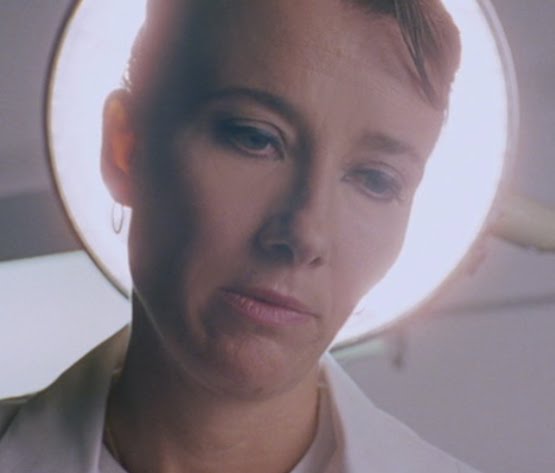 What follows is a republishing of a piece I'm proud of from our very first season of Hit Me With Your Best Shot (you can see the index of all six seasons here) when I was somehow far more concise with "Best Shot" despite feeling like I was overdoing it. I've added in notes and links for contributions from other Best Shot participants and I'd like to thank Manuel heartily before we begin for his fascinating contextual work on HBO's long history of LGBT films and series this summer and for sharing this week's HBO LGBT episode with us for our redo episode of this Great Work. Read that piece before you read this. Ready? Let's begin...
What follows is a republishing of a piece I'm proud of from our very first season of Hit Me With Your Best Shot (you can see the index of all six seasons here) when I was somehow far more concise with "Best Shot" despite feeling like I was overdoing it. I've added in notes and links for contributions from other Best Shot participants and I'd like to thank Manuel heartily before we begin for his fascinating contextual work on HBO's long history of LGBT films and series this summer and for sharing this week's HBO LGBT episode with us for our redo episode of this Great Work. Read that piece before you read this. Ready? Let's begin...
Tony Kushner's extraordinary two part stage epic Angels in America centers around two overlapping young couples in the mid 80s, struggling married Mormons, pill popping Harper and her closeted husband Joe and the gay couple Louis and Prior they become connected spiritually (Harper befriends Prior... in her dreams) and physically (Joe becomes Louis's other lover). But it's also about politics, immigration, religion, identity, and evolution and encompasses multiple other characters from Louis's outspoken gay friend Belize, to Joe's mother, to the evil lawyer Roy Cohn, the dead Communist Ethel Rosenberg, and a frequently orgasmic Angel who descends on many of the players. This masterpiece was adapted for the screen in 2003 by Oscar winner Mike Nichols. Along its journey it won 7 Tonys, The Pulitzer, and later 5 Golden Globes and 11 Emmys and here's the thing: it deserved every single prize. If you haven't seen it drop everything (seriously everything) because it is unmissable. I've seen it performed on stage three times in three different states with wildly different budgets and casts and seen the miniseries a few times too... and every single time it's a fascinating prismatic living thing, like it will always be teaching you, entertaining you, and provoking you.
Rather than limit myself to one shot I'm picking one from each of its chapter. This I can manage!
Chapter 1 "Bad News"
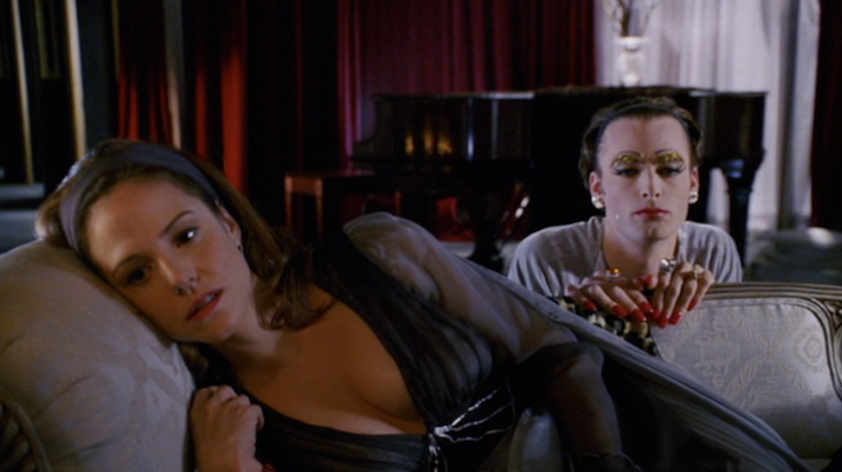
Mary Louise Parker and Justin Kirk in their pre-Weeds duet. Harper and Prior, the abandoned lovers of the play, are dolled up to provide themselves with distracting glamour in their shared hallucination. But their lonely hearts club memberships are too strong for these distractions to be successful. The framing is deliciously funny here. You could title this still "The Lurking Homosexual" and really, whether it's the men Harper imagines behind walls, or her own husband or this imaginary friend "aren't you too old for imaginary friends?" she knows he's there.
SEE ALSO: Tim Brayton also concentrated on this chapter for his choice, with a typically wonderful writeup which contains this choice bit in the intro...
Part of the point of Angels in America is that it is a massive, uncontainable beast of a thing, serving as a summary referendum on the history of the United States from prior to its founding to the AIDS crisis of the 1980s (the story is set in 1985), with special attention paid to how identity intersects with history; mostly, but not solely, homosexual identity. It's trying to be about Everything, and the scary thing is how close it comes to succeeding.
Best Shot in the Dark chose eight images choosing them based on their reminders of...
incredible performance beats, brain-burned references, pure fabulousity and/or utter beauty.
Jason at The Entertainment Junkie does all five chapters but also picks these two (but not this shot) from this chapter, writing:
What's really great about this moment is that both characters are looking at themselves in the mirror, but Prior is in drag, play-acting as Joan Crawford just moments before. Despite this being the threshold, Prior isn't seeing his true self - the chosen prophet of the angels - but rather a costumed vision of himself. Harper, despite being heavily medicated and possibly insane, sees herself clearly.
Chapter 2 "In Vitro"
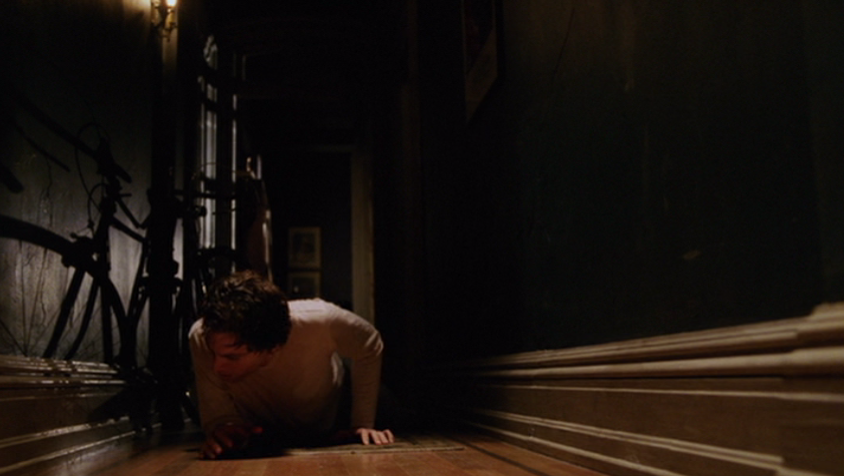
There are so many shots in the six hours where Prior looks devastatingly lonely as both his condition and his fury at the deficient boyfriend grows. Here the darkness is going to swallow him up.
SEE ALSO: Movie MoJoe neglects to mention which chapter his shot is from but it's a famous one (the scene, not the shot). As he writes:
The scenes feel like they could lay on top of each other, because they are so similar. Louis and Joe announce to their partners that they are leaving them, and the drama unfolds. This is easily a favorite among college students who discover Angels during their first semester acting classes
Chapter 3 "The Messenger"
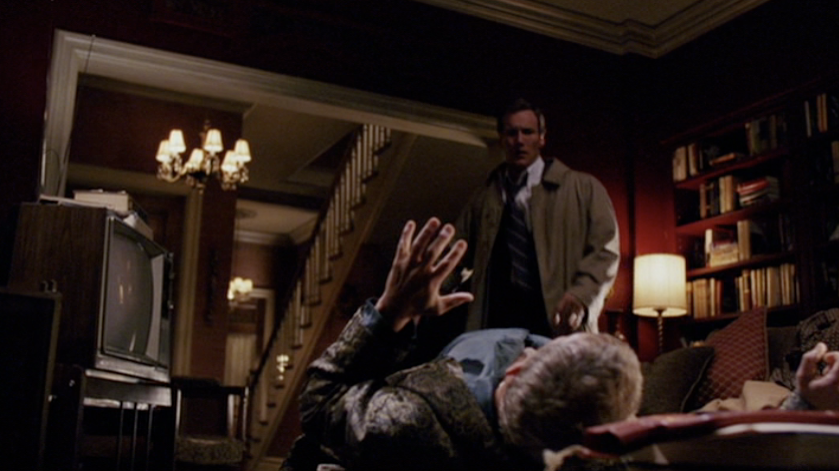
It's a slightly canted angle, which tends to be lazy shorthand for "TENSION!" but I mostly chose this shot because the physicality in the relationship between leering Roy (Al Pacino) and confused Joe (Patrick Wilson) is so fascinating. Roy is constantly pawing at Joe, totally hot for the young buck. Joe is mostly oblivious but likes to be touched. And yet, it always comes out wrong... particular between these two men; their next close physical contact will involve clenched shirts, gay confessions and lots of blood. Joe raises his fist and Roy keeps egging him on (he wants sex but he'll definitely take violence as a substitute -- check out the dirty thrill in Pacino's eyes with a sideways glance to Joe's fist)... it's all so disturbing. Roy Cohn is basically the devil. He's asking Joe to sin -- pick a transgression, any transgression -- but the genius of the scene is that it's not terrible advice in this case. Something's gotta give.
SEE ALSO: Captain Sting at Movie Motorbreath details how he's changed since first seeing the miniseries 8 years ago and has interesting thing to say about the way Roy Cohn is actually framed by the camera in this chapter including:
We never actually see Cohn having power. His AIDS diagnosis is revealed extremely early, we know he’s a weak rabid old dog trying to gnaw at Joe’s leg for a last hurrah at Washington, D.C. and even the camera won’t give him any dignity he so desperately pretends to think he deserves.
Dancin Dan' only focuses on Millenium Approaches (the first three chapters) but shares 6 favorite shots
Emma Thompson once gave Meryl Streep an orgasm. NEVER FORGET."
Chapter 4 "Stop Moving"
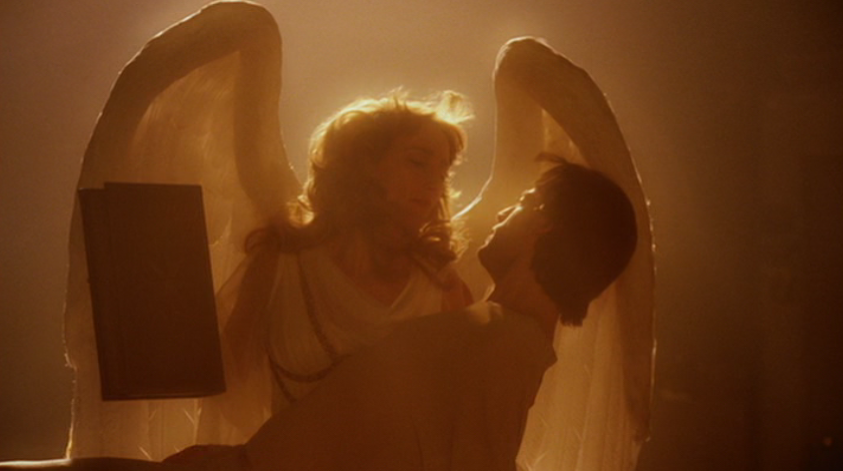
This scene is excitingly lit, both for its obvious bids for EPIC MOMENT status and for its rapidfire shifts in feeling: glaring whites, golden softness, blue mood. Plus, Emma Thompson is just hilarious as the self regarding, impatient and highly vocal heavenly creature.
SEE ALSO: Sorta That Guy also loves the drama of this chapter writing:
ridiculous, scary, beautiful, and insane all at the same time.
Magnificent Obsession returns to Emma Thompson's grand work as the Angel for more than one of the chapter's Best Shots. Marvelling that she's...
...able to give the figure its gravitas, grandiosity and overt dramatics, while never seeming to let go a certain silliness and humor that turns her angel into both a messenger of the apocalypse and a self-aware, overdramatic, celestial bureaucrat.
Chapter 5 "Beyond Nelly"
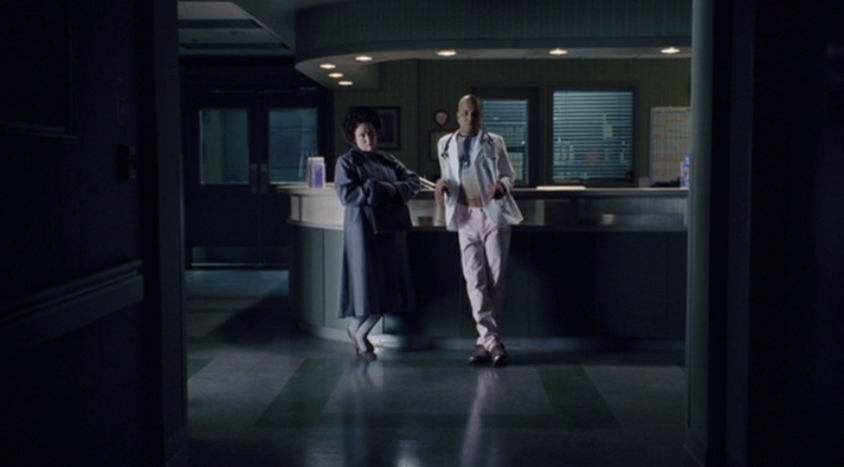
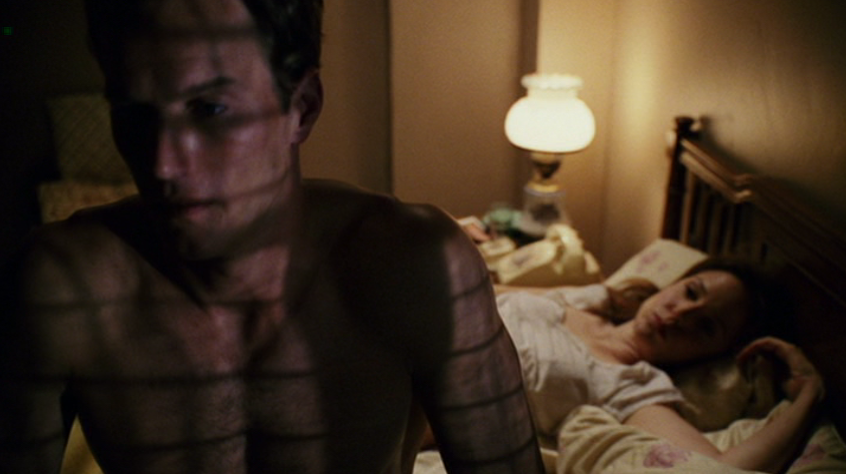
Here's where I stop being able to choose. It's late at night. I'm exhausted and I love every hallucination in this great piece of theatermovie. An astounding monologue about racial impurity and the afterlife from Belize (Jeffrey Wright) to Roy ends with this condescending dreamy dismissal "Go to sleep now baby. I'm just the shadow on your grave." Director Mike Nichols and cinematographer Stephen Goldblatt chase that line with this incredible image above.
Both the dead (Meryl Streep as Ethel Rosenberg) and the living (Belize...but "out" gay men in general, really) are haunting Roy. And they'll cast a shadow over him forever. But isn't it rich that you could layer that threatening lullaby monologue over the nearby image of Joe and Harper's tragically unsexy reconciliation and it would work just as well.
Everyone is haunting everyone.
SEE ALSO: Andrew Kendall at Encore's World focused his Best Shot essay to the play's lost soul Joe. I loved this bit...
Not that Joe could come to a happy ending (he's too uncertain, and sad, and embarrassed) but as the film goes on it feels so decidedly disinterested in him making the earnest sincerity with which Patrick Wilson performs that much more unusual. Joe's fate makes me think of questions like who deserves redemption? And at what cost? Is Joe's transgression more heinous than Louis, for example? Or Hannah's? What is the unforgivable aspect of Joe? His unwillingness to evolve? Being closeted? Being a Republican? These questions cannot really be answered but Wilson's dexterous handling of an almost impossible character really is a marvel. (It is also a woeful reminder that he's never been given an opportunity to do anything as great on the big screen).
Chapter 6 "Heaven, I'm in Heaven"
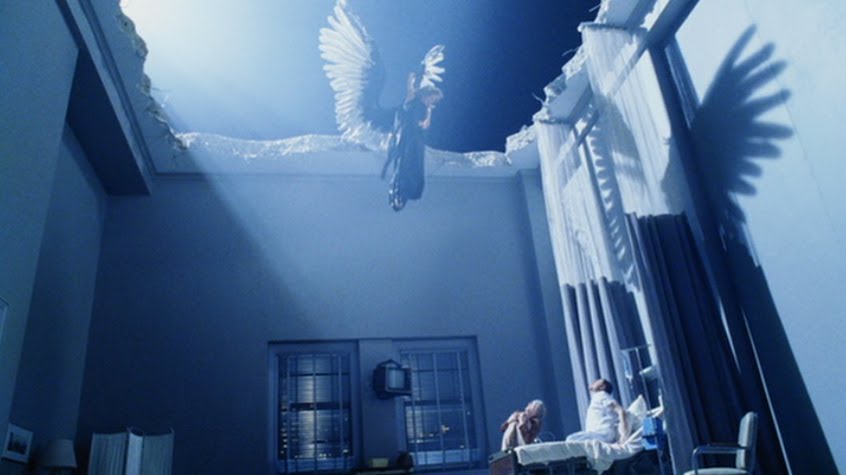
My favorite part of chapter six is the frankly incredible duet between Meryl Streep and Al Pacino as they trade hauntings and tauntings, one dead and one dying but both entirely obsessed with defeating the other. "I WIN!" It's the kind of lengthy scene you dream of seeing Great Actors perform together. Neither of them pull any punches but it's also not lazily over the top. It's perfection, a lucid dream of a duet. But I couldn't decide on a shot. So let's hear it for this absurd diorama above (so chintzy, boxy and tiny) that is the Angel's final arrival. It's an epic in miniature, both entirely cinematic and thoroughly stagebound. Any time Angels in America embraces both modes simultaneously, it wins.

Next on "Best Shot": Mad Max Fury Road (2015) on Monday, September 7th
Get the DVD and choose your Best Shot by then.